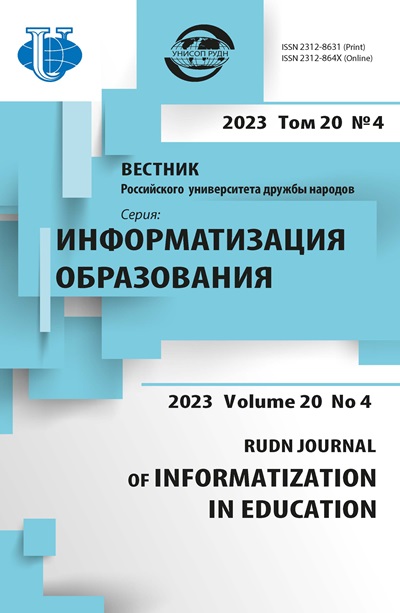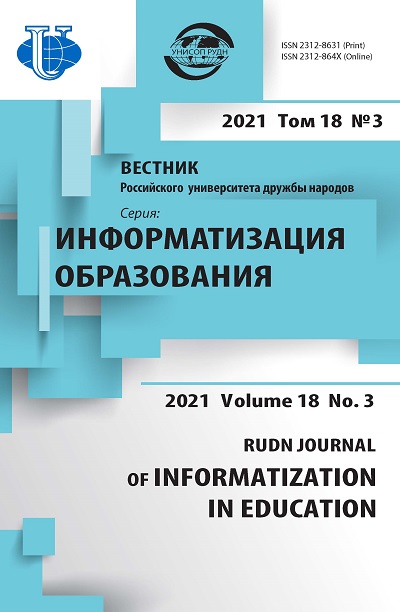Assessment of the effectiveness of the electronic educational environment “Moodle” by the cadets of the higher educational institution of the Ministry of Internal Affairs of Russia before and during the COVID-19 pandemic
- Authors: Lopatin E.A.1, Shkabin G.S.2
-
Affiliations:
- Vladimir Kikot Moscow University of the Ministry of Internal Affairs of Russia, Ryazan Branch
- Research Institute of the Federal Penitentiary Service
- Issue: Vol 18, No 3 (2021)
- Pages: 212-226
- Section: DIGITAL EDUCATIONAL ENVIRONMENT
- URL: https://journals.rudn.ru/informatization-education/article/view/29962
- DOI: https://doi.org/10.22363/2312-8631-2021-18-3-212-226
Cite item
Full Text
Abstract
Problem and goal. The beginning of the COVID-19 coronavirus pandemic led to the widespread transition of universities in the country and around the world to distance learning. The analysis of available studies in Russia, South Africa, Switzerland and other countries of the world allowed to conclude that there are insufficient comparisons of assessments of the use of distance education technologies before the coronavirus pandemic and after its first waves. The article is devoted to the study of the problem of assessing the capabilities of the electronic information educational environment “Moodle” in the educational organization of the Ministry of Internal Affairs of Russia before and during COVID-19. Methodology. A comparison of the results of a survey among cadets of the Ryazan branch of the Vladimir Kikot Moscow University of the Ministry of Internal Affairs of Russia in 2017 and 2021 was made. Results. The empirical study revealed that after the first two waves of the pandemic and the gradual return to a more traditional full-time form of education among the cadets there are no those who rarely use the Moodle. The number of positive assessments of the effectiveness of using the Moodle and its impact on reducing the time spent on studying has increased. The article explains the identified request of students to improve the means of distance learning, in particular, in the direction of reducing complexity, increasing entertainment, reducing the time for checking materials. Conclusion. Working in an electronic information educational environment has become familiar to students, and they have come to realize the need to solve small problems. There is an ingrained understanding of the inevitability of introducing elements of distance learning into full-time education.
About the authors
Egor A. Lopatin
Vladimir Kikot Moscow University of the Ministry of Internal Affairs of Russia, Ryazan Branch
Author for correspondence.
Email: eg.lopatin@gmail.com
Candidate of Pedagogical Sciences, Associate Professor of the Department of Social and Humanitarian Disciplines
18 1-ya Krasnaya St, Ryazan, 390043, Russian FederationGennadiy S. Shkabin
Research Institute of the Federal Penitentiary Service
Email: uprzn@ya.ru
Doctor of Law Sciences, Associate Professor, Chief Researcher of the Research Center - 2
14 Zhitnaya St, Moscow, 119991, Russian FederationReferences
- Romero E, García L, Ceamanos J. Moodle and Socrative quizzes as formative aids on theory teaching in a chemical engineering subject. Education for Chemical Engineers. 2021;(36):54–64.
- Yang Y, Hooshyar D, Pedaste M, Huang Y-M, Lim H. Predicting course achievement of university students based on their procrastination behaviour on Moodle. Soft Computing. 2020;(24(24)):18777–18793.
- Cherkasova MA. Transformation of the educational process in a pandemic and the importance of electronic support for its practice. Municipal Academy. 2020;(3):58–61. (In Russ.)
- Dudin MN, Kononova EV. Management of higher education in the face of great challenges and threats caused by the COVID-19 coronavirus pandemic. Problems of the Market Economy. 2020;(2):133–145. (In Russ.)
- Grinshkun VV, Krasnova GA. Development of education in the era of the fourth industrial revolution. Informatics and Education. 2017;(1(280)):42–45. (In Russ.)
- Nabokova LS, Rogacheva YuS. Digital educational environment in a pandemic: the intentions of the student audience. Professional Education in the Modern World. 2020;10(3):4041–4052. (In Russ.)
- Antropova ON, Semikolenova MN, Rudakova TA, Polyakova IG. Study of the practice of distance learning in universities in the context of a pandemic. World of Science, Culture, Education. 2021;(1(86)):104–107. (In Russ.)
- Minaev AI, Isaeva ON, Kiryanova EA, Gornov VA. Features of the organization of the university's activities in the context of a pandemic. Modern Problems of Science and Education. 2020;(4):1–9. (In Russ.)
- Gordeeva LK, Myasnikova TS. The use of distance learning in a pandemic: advantages and disadvantages (based on the material of a sociological survey). Azimuth of Scientific Research: Pedagogy and Psychology. 2021;10(1(34)):196–198. (In Russ.)
- Astafieva OV, Degtyarenko AA, Shulaev KS The influence of online learning and distance technologies on the educational process in modern conditions. National Interests: Priorities and Security]. 2021;17(2):385–400. (In Russ.)
- Dascalu M-D, Ruseti S, Dascalu M, Rebedea T, Trausan-Matu S. Before and during COVID-19: a cohesion network analysis of students’ online participation in Moodle courses. Computers in Human Behavior. 2021;(121):106780.
- Campanyà C, Fonseca D, Amo D, Martí N, Peña E. Mixed analysis of the flipped classroom in the concrete and steel structures subject in the context of COVID-19 crisis outbreak: a pilot study. Sustainability. 2021;13(11):5826.
- Premadasa S, Jayaweera PM. The influence on mobile learning: mobile learning contents, higher education institutes, and communication technology. 2020 2nd International Conference on Advancements in Computing (ICAC). 2020. p. 7–12.
- Mpungose CB. Emergent transition from face-to-face to online learning in a South African University in the context of the coronavirus pandemic. Humanities and Social Sciences Communications. 2020;7(1):113.
- Kryuchkov VV, Rabazanov SI, Lopatin EA, Sinelnikov IYu. Possibilities of the electronic educational environment “Moodle” in the higher educational institution of the system of the Ministry of Internal Affairs of Russia. Human Capital. 2017;(12(108)): 83–87. (In Russ.)
















